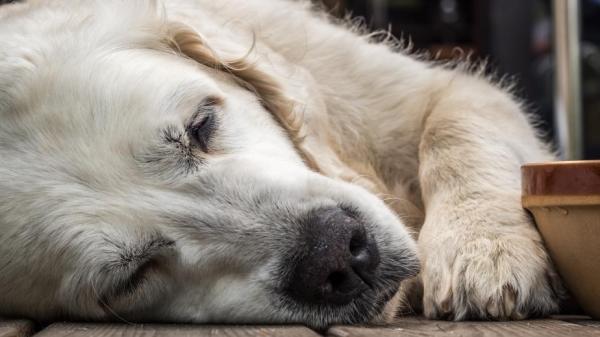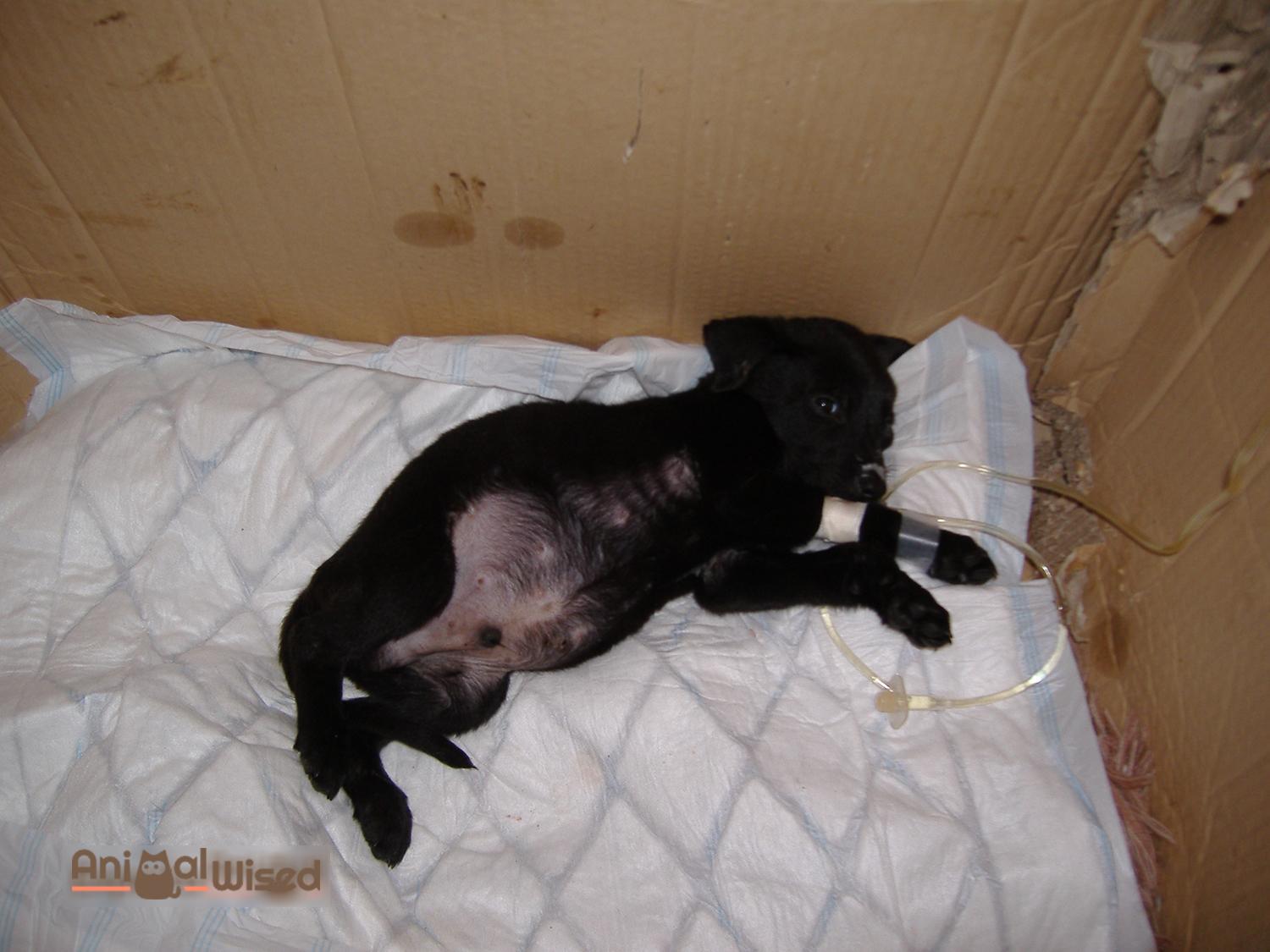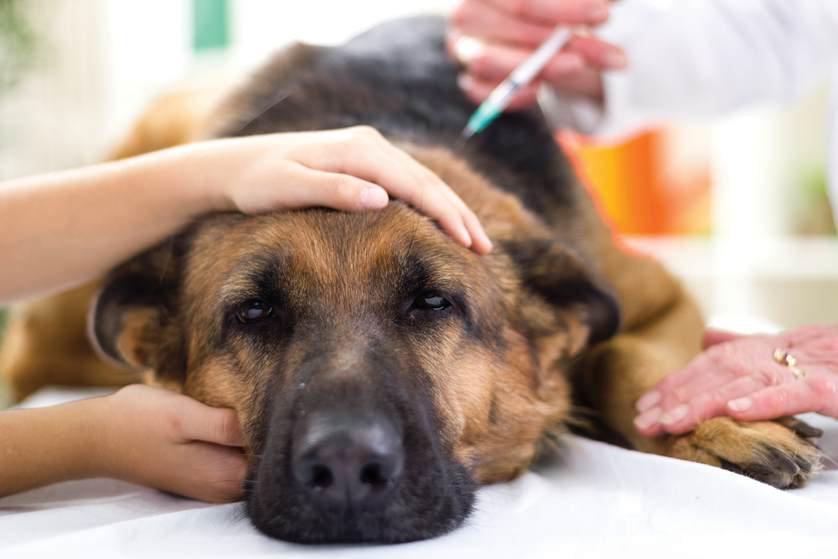Why is My Dog's Belly Hard



See files for Dogs
After eating too much or too quickly, it is common to see our dog with a swollen belly. Perhaps they have even been putting on the pounds recently and they are simply in a need of a little diet and exercise. However, your dog’s belly is swollen and hard, then these are disconcerting symptoms. The cause of this stomach swelling in dogs can vary, but something which makes a difference is whether or not it occurs when the dog is a puppy or an adult. Whatever age your dog is, if your dog has a swollen or bloated belly, it can be a sign an underlying problem and serious consideration is needed for a diagnosis.
Your veterinarian is the only one who will be able to reach a proper diagnosis when it comes to stomach swelling in dogs. Here at AnimalWised we will provide you with some potential answers as to why your dog's belly is hard.
- My puppy's belly is hard
- How to eliminate intestinal parasites in puppies
- Causes of swollen and hard belly in adult dogs
- Which dogs does gastric dilatation volvulus (gastric torsion) affect the most?
- How to prevent gastric torsion in dogs
- Other causes why my dog's stomach is hard
- What to do if your dog's belly is hard
My puppy's belly is hard
If we adopt a puppy from a reputable source, then they should not be removed from their mother before a minimum of 8 weeks. This is so the puppy can be weaned correctly. They should also be given their vaccinations and deworming schedule to ensure they have the healthiest start in life.
You may, however, have come into adopting a puppy from an irresponsible breeder (without our knowledge) or even taken in a stray. If the latter occurs, it is possible they have not been given the right level or care and will be more susceptible to certain diseases, infections and other health conditions.
However your puppy came to be, you can never be 100% certain they will not develop some complications. This is mainly due to their vulnerable status as a young dog. If we see that our puppy has a swollen belly, then we need to find out the root cause. Infections can be passed down from mother to puppy through breastfeeding, even if the mother isn't ostensibly sick. The most common puppy diseases carried through breastfeeding are intestinal parasites which pass through the mother’s milk. This is one of the reasons deworming a puppy from 15 days of age is important.
Remember that there is a difference between a hard swollen belly and a normal swollen belly. If a puppy has just eaten, as with humans, it will will look bloated. But this puppy bloating is considered normal and healthy. By pressing the dog's stomach gently. If they have a hard puppy belly or the bloat doesn't go down after eating, action is required.
How to eliminate intestinal parasites in puppies
It is relatively common for puppies to be infested by intestinal parasites such as roundworm (a type of nematode). However, you cannot rule out the possibility of other parasites in dogs. This is why following the recommendations and guidelines of your veterinarian is very important. Deworming to prevent infestation is one of the most important.
In general, internal deworming treatments for dogs will come in the form of syrup, paste or pills. The treatment will be repeated every 15 days until the first vaccination schedule is finished. After this, dog vaccinations should be administered every 3 - 6 months throughout an animal's life, even if the dog's belly is no longer swollen and hard[1].
Although deworming treatment in dogs is routinely administered, it is important to observe the puppy's condition before giving it any sort of medicinal product. This is because applying a deworming treatment can be counterproductive in a sick and distressed puppy (especially with diarrhea) if the root cause is not actually a parasite.
In non-parsite cases cases, it is better to restore the puppy to health before administering something which could potentially weaken them further. Most parasites are a fairly common and mild condition which are often asymptomatic. However, serious untreated infestations can also be life threatening. For more, we recommend taking a look at our article onwhat to do if my dog has diarrhea.

Causes of swollen and hard belly in adult dogs
The cause of a hard belly in dogs is usually due to an inflammation caused by some other concern. This hard belly often indicates the appearance of a serious pathology. This could be due to many things such as:
- Indigestion
- Tumors (cancerous or not)
- Ascites (accumulation of fluid)
- Cushing's syndrome
- Gastric torsion
Whatever this root cause of your dog’s hard stomach, an examination will need to be carried out by a vet to proceed with the correct treatment. They will also look at the context of the dog's health. For example, a pregnant female dog cries when you touch her belly. This is not normal and could imply there is a problem.
However, if the belly is hard, one of the most common causes is gastric dilatation volvulus (GVD). This is more commonly known as gastric torsion in dogs or, simply, bloat. This disorder is potentially life threatening and requires veterinary intervention. It is considered an emergency and is characterized by one of two processes:
- Dilation of the stomach due to a build up of gas and/or fluid.
- The stomach, already distended, twists and rotates on its access. The spleen, attached to the stomach, also rotates.
In either circumstance, neither gas nor liquid can leave the stomach. The dog will, therefore, be unable to burp or vomit to relieve this pressure. The stomach is distended because as these accumulations are causing the stomach to become so bloated.
Blood circulation is also affected so that necrosis (involuntary cell death) occurs in a dog’s stomach wall. This case can be further exacerbated by perforation, peritonitis, circulatory shock, etc. This is why bringing a dog with a swollen and hard belly to the vet is so important, specifically since the mortality rate is high.
Which dogs does gastric dilatation volvulus (gastric torsion) affect the most?
Gastric torsion occurs most often in middle-aged and geriatric dogs. It is not only present in older dogs, but is also more common in larger breeds with wider chests, as they have a greater propensity due to the size of their anatomy. Gastric torsion is common in larger dogs breeds such as, German Shepherds, Boxers and Labrador Retrievers[2].
Gastric torsion in dogs is a condition which can occur suddenly and is usually related to the intake of a large meal, vigorous exercise immediately after a large meal or drinking too much water after ingestion. The typical symptoms of canine gastric torsion include:
- Restlessness, nervousness or agitation
- Nausea with unsuccessful attempts to vomit
- Distension of the abdomen
- Pain when touching the belly
It is essential to take a dog with a swollen and hard belly to the vet. They will determine whether the inflamed belly is indeed gastric dilation volvulus or if there is another diagnosis to be made. If it is a positive gastric torsion diagnosis, then immediate action is required. Once the dog is stabilized, surgery will usually be carried out. Prognosis depends on the success of the surgery and how quickly action was taken[3].

How to prevent gastric torsion in dogs
Gastric dilation volvulus can be a recurring process, potentially returning multiple times. Because of this, if your dog is at risk of gastric torsion or it has occurred before, it is important to implement a series of measures to prevent gastric torsion in your dog:
- Divide daily food into appropriate portions.
- Restrict access to water before and after meals.
- Avoid walking where there is abundant water sources for the dog.
- Avoid intensive exercise when on a full stomach.
Above all, go the vet when you first see the symptoms of gastric torsion. It could be imperative.
Other causes why my dog's stomach is hard
Dog's belly is swollen and hard from gas
Dogs can suffer from gas, just as we can. Some guardians with very flatulent dogs will know this all too well. There are several reasons for this problem, especially:
- Poor quality food
- Sudden dietary changes
- Swallowing without chewing
- Poor digestion
- Parasites/gastrointestinal problems
Some dogs may be more prone to gas than others, without it posing a serious threat to their health. However, this will need to be determined by the veterinarian. The dog's stomach will bloat without necessarily becoming hard. When it does become hard and/or painful, this is when bloat is expected.
Dog's belly is bloated and vomiting
When your dog has a swollen stomach and they are vomiting concurrently, it is a sign something is wrong. As with puppies, it is possible the dog has an internal parasite infestation such as tapeworms, roundworm, hookworm, etc.
Although it is more common in puppies, it is possible adults will contract them. In fact, many adults have infestations which are asymptomatic for a long time before bloating becomes a symptom. Coccidia is one example. Apart from a hard stomach, symptoms can manifest as blood in stool, general weakness, loss of appetite, and others.
Dog's belly is bloated and soft
Another cause of a bloated stomach in dogs is a bowel obstruction. This can develop for a variety of different reasons. The most common are:
- Tumors
- Hernias
- Foreign objects
- Stenosis
All of the above are serious situations and need to be addressed by a veterinarian. The softness or hardness of the stomach will depend on the cause. For example, tumors are usually hard, but the foreign object in the GI tract might be soft. Only a specialist can diagnose and treat it properly.

What to do if your dog's belly is hard
Since most of the causes of a distended, bloated or hard stomach in dogs are serious, it is necessary to go to the veterinarian as soon as possible. If the underlying cause of abdominal swelling is not treated promptly, it can lead to the death of the animal.
The treatment of the swollen belly will depend on the cause. For example, gastric torsion is not the same as simple gas. As well as visiting the vet, it is important to consider the diet of your dog and ensure they are following the most appropriate guidelines for their specific nutritional needs. With any dog, we need to ensure their food is of sufficient quality.
Checking if the dog is properly dewormed and vaccinated is also very important. However, none of these are viable alternatives to receiving a diagnosis from a veterinary specialist.
If you found this article helpful, we recommend watching our YouTube video below on 5 reasons deworming dogs is important.

This article is purely informative. AnimalWised does not have the authority to prescribe any veterinary treatment or create a diagnosis. We invite you to take your pet to the veterinarian if they are suffering from any condition or pain.
If you want to read similar articles to Why is My Dog's Belly Hard, we recommend you visit our Other health problems category.
1. Zanzani, S. A., et al. (2014). Intestinal Parasites of Owned Dogs and Cats from Metropolitan and Micropolitan Areas: Prevalence, Zoonotic Risks, and Pet Owner Awareness in Northern Italy. BioMed Research International, 696508.
https://www.hindawi.com/journals/bmri/2014/696508/
2. Glickman, L. T., et al. (2000). Non-Dietary Risk Factors for Gastric Dilatation-Volvulus in Large and Giant Breed Dogs. J Vet Med Assoc, 217(10), 1492-1499.
https://www.ncbi.nlm.nih.gov/pubmed/11128539
3. Grauer, G. F., & DeYound, D. W. (1978). Gastric Dilation and Volvulus in the Dog. Iowa State University Veterinarian, 40(1).
https://lib.dr.iastate.edu/cgi/viewcontent.cgi?article=2892&context=iowastate_veterinarian









